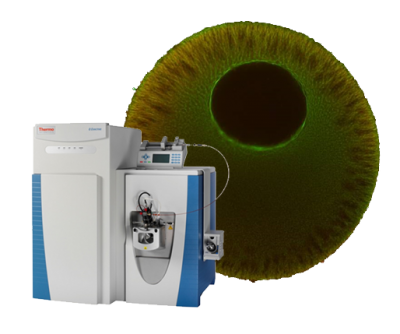Accurate, Sensitive, and Precise Multiplexed Proteomics Using the Complement Reporter Ion Cluster
Publication Year
2018
Type
Journal Article
Abstract
Quantitative analysis of proteomes across multiple time points, organelles, and
perturbations is essential for understanding both fundamental biology and disease
states. The development of isobaric tags (e.g. TMT) have enabled the simultaneous
measurement of peptide abundances across several different conditions. These
multiplexed approaches are promising in principle because of advantages in throughput
and measurement quality. However, in practice existing multiplexing approaches suffer
from key limitations. In its simple implementation (TMT-MS2), measurements are
distorted by chemical noise leading to poor measurement accuracy. The current state-ofthe-
art (TMT-MS3) addresses this, but requires specialized quadrupole-iontrap-Orbitrap
instrumentation. The complement reporter ion approach (TMTc) produces high accuracy
measurements and is compatible with many more instruments, like quadrupole-
Orbitraps. However, the required deconvolution of the TMTc cluster leads to poor
measurement precision. Here, we introduce TMTc+, which adds the modeling of the MS2-
isolation step into the deconvolution algorithm. The resulting measurements are
comparable in precision to TMT-MS3/MS2. The improved duty cycle, and lower filtering
requirements make TMTc+ more sensitive than TMT-MS3 and comparable with TMT-MS2.
At the same time, unlike TMT-MS2, TMTc+ is exquisitely able to distinguish signal from
chemical noise even outperforming TMT-MS3. Lastly, we compare TMTc+ to quantitative
label-free proteomics of total HeLa lysate and find that TMTc+ quantifies 7.8k versus 3.9k
proteins in a 5-plex sample. At the same time the median coefficient of variation
improves from 13% to 4%. Thus, TMTc+ advances quantitative proteomics by enabling
accurate, sensitive, and precise multiplexed experiments on more commonly used
instruments.
perturbations is essential for understanding both fundamental biology and disease
states. The development of isobaric tags (e.g. TMT) have enabled the simultaneous
measurement of peptide abundances across several different conditions. These
multiplexed approaches are promising in principle because of advantages in throughput
and measurement quality. However, in practice existing multiplexing approaches suffer
from key limitations. In its simple implementation (TMT-MS2), measurements are
distorted by chemical noise leading to poor measurement accuracy. The current state-ofthe-
art (TMT-MS3) addresses this, but requires specialized quadrupole-iontrap-Orbitrap
instrumentation. The complement reporter ion approach (TMTc) produces high accuracy
measurements and is compatible with many more instruments, like quadrupole-
Orbitraps. However, the required deconvolution of the TMTc cluster leads to poor
measurement precision. Here, we introduce TMTc+, which adds the modeling of the MS2-
isolation step into the deconvolution algorithm. The resulting measurements are
comparable in precision to TMT-MS3/MS2. The improved duty cycle, and lower filtering
requirements make TMTc+ more sensitive than TMT-MS3 and comparable with TMT-MS2.
At the same time, unlike TMT-MS2, TMTc+ is exquisitely able to distinguish signal from
chemical noise even outperforming TMT-MS3. Lastly, we compare TMTc+ to quantitative
label-free proteomics of total HeLa lysate and find that TMTc+ quantifies 7.8k versus 3.9k
proteins in a 5-plex sample. At the same time the median coefficient of variation
improves from 13% to 4%. Thus, TMTc+ advances quantitative proteomics by enabling
accurate, sensitive, and precise multiplexed experiments on more commonly used
instruments.
Journal
Analytical Chemistry

